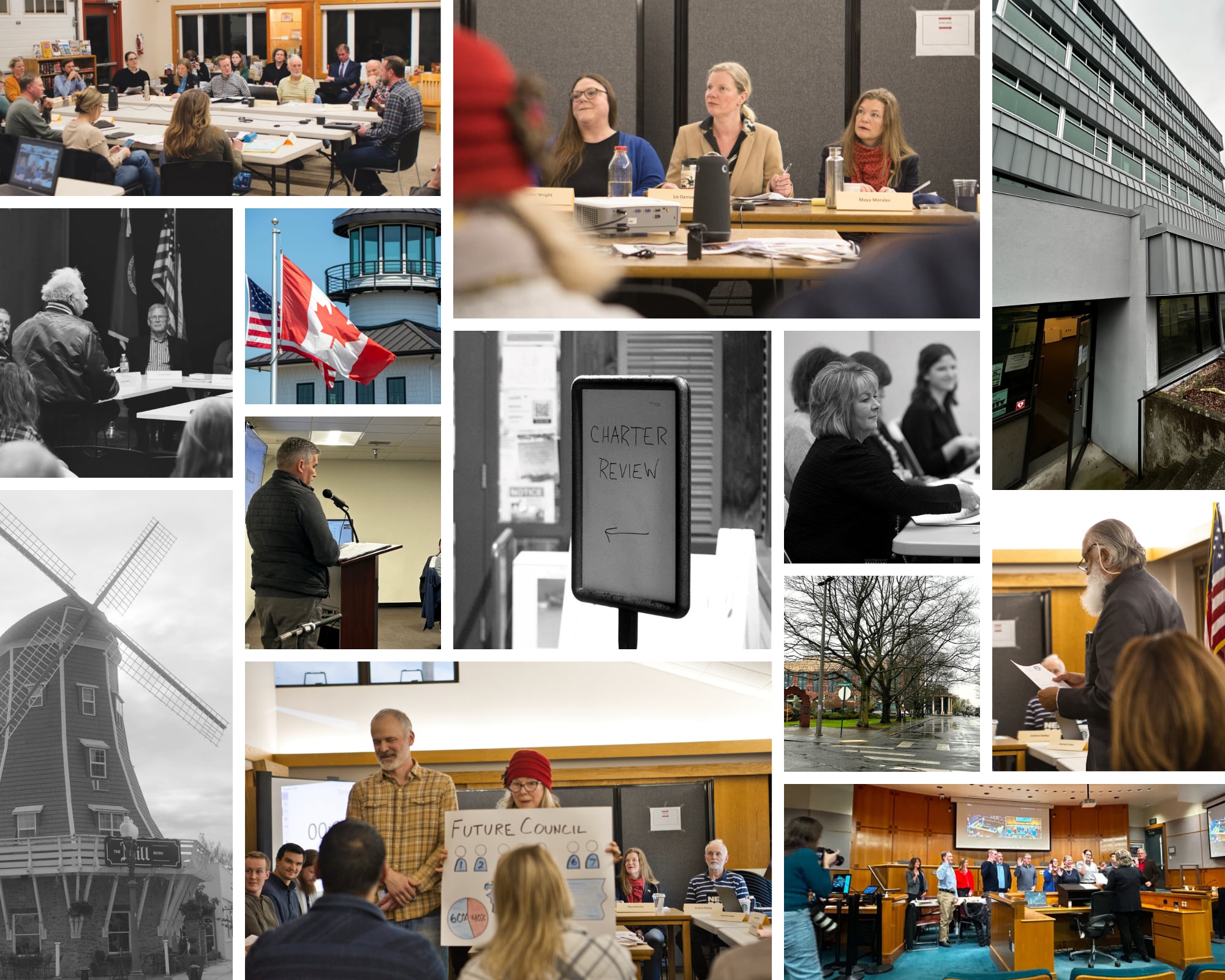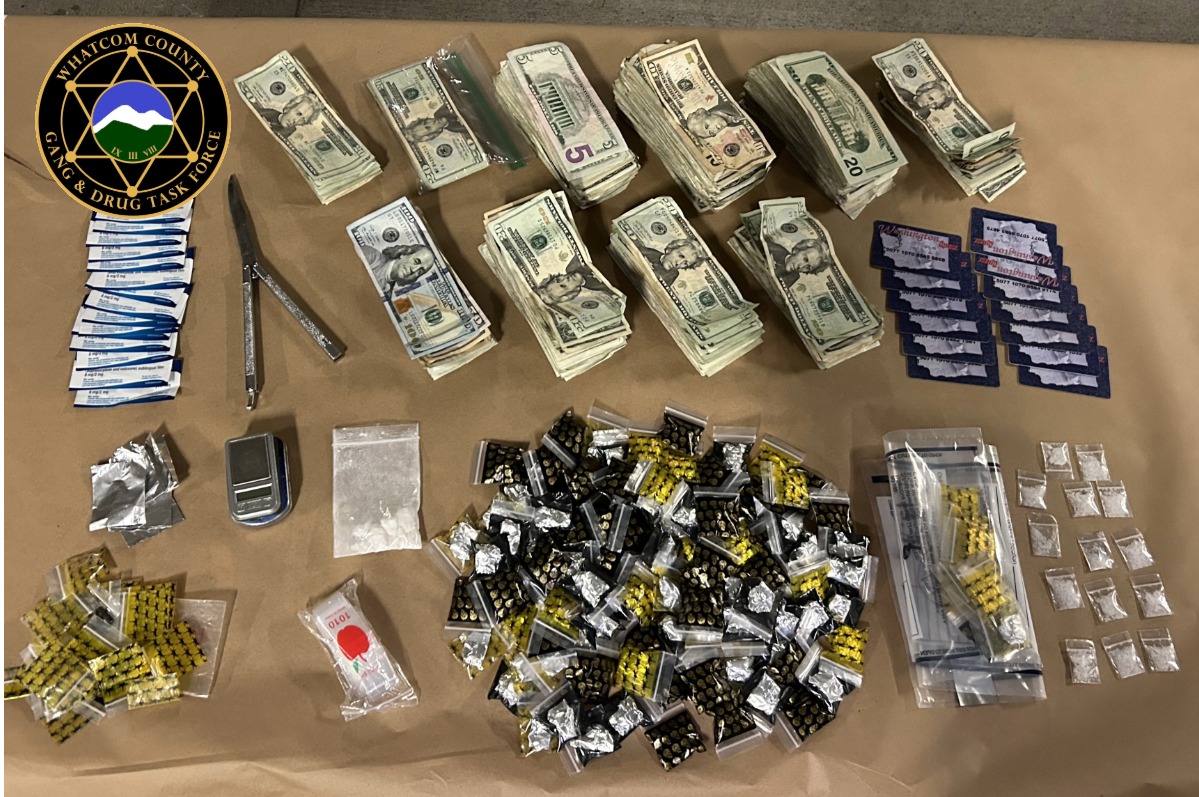By Greg Thames
Picture 15 Whatcom County residents, clutching notebooks and coffee mugs, gathered in libraries and community halls to rewrite the county’s governing charter. That’s the Whatcom County Charter Review Commission (CRC), now halfway through its 2025 mission to update the rules that keep local government ticking. It’s not a high-stakes thriller but more like a marathon planning session, hashing out a dense manual with enough passion to keep things lively. For Whatcom’s 230,000 residents, here’s a rundown of what the CRC’s been up to, sprinkled with wit that sneaks up on you. This is about your vote, your taxes, and your voice in the county’s future—democracy with a side of purpose.
A Shaky Start, Like a New Project’s First Draft
The CRC launched in January like a team tackling a group project without a clear outline—full of energy but stumbling over details. Their first meeting, January 6 at the Whatcom County Courthouse, focused less on big charter changes and more on the basics: how do you run a meeting without getting lost in a maze of rules? Commissioner Joe Elenbaas, a veteran of past charter reviews, insisted they needed a playbook before picking a leader, like sketching a map before a road trip. The majority moved forward, electing Liz Darrow as chair with eight votes and Jennifer Wright as vice-chair on January 13. They passed procedural rules 14-1, but not before debating tabled motions like it was a standoff over the last piece of meeting-room pizza. The quiet takeaway? Democracy’s messy, like knocking over your coffee during a brainstorm.
To keep things open, the CRC’s holding meetings across the county, from the Ferndale Library (January 27) to the Nooksack Tribe’s Mi’sq’eq’o Community Building (May 8). They’ve pushed for county email addresses to connect with voters transparently, which they got!!. Meetings are scheduled at 6 p.m. on the second and fourth Thursdays, with deep dives into charter articles at select sessions:
- February 27: Deming Library (Article 2 – Legislative Branch)
- March 13: Blaine Library (Article 3 – Executive Branch)
- March 27: East Whatcom Regional Resource Center (Article 4 – Elections)
- April 10: Whatcom County Courthouse (Article 5 – Public Interest)
- April 24: Cordata Elementary School (Article 6 – Financial Administration)
- May 8: Mi’sq’eq’o Community Building (Articles 7 & 9 – Personnel System, General Provisions)
- May 22: Civic Annex Garden Room (Article 8 – Charter Review and Amendments)
- June 12: Whatcom County Courthouse (Preamble & Article 1 – Powers of the County)
- June 26: Civic Annex Garden Room
- July 10: Whatcom County Courthouse
This rotation, plus special meetings like April 7 at the Civic Annex, shows the CRC’s commitment to accessibility. The amendment process—propose, research, debate, vote—is slower than a long line at the post office but designed to let voters weigh in and ensure changes align with state laws, as the county attorney stressed during training on Washington’s Open Public Meetings Act.
Proposals Piling Up Like Meeting Notes
The CRC’s job is to suggest charter updates, and they’ve proposed 13 amendments, stacking ideas faster than a clerk files paperwork. These could shape your tax bill, your vote’s weight, and how you get heard. Below is a table of all proposals, followed by a summary of key debates and what they mean for voters.
| Proposed Amendments | Status |
| Proposed Amendment 1 Require Convener to Determine Rules for Initial Charter Review Commission Meeting Proposed by Jon Mutchler Description: Stipulates that the Charter Review Commissioner who receives the highest number of votes (the “convener”) shall select a set of meeting rules that will govern the first meeting of the commission until a permanent set is adopted by the commission. Introduced January 27, 2025 | APPROVED to send to voters by 11-4 vote on February 13, 2025 |
| Proposed Amendment 2 Permit Charter Review Commission Candidates to Have the Same Word Count in Voter Publications as Other Local Office Seekers Proposed by Jon Mutchler Description: Permit citizens running for Charter Review Commission to use up to 300 words in their bio/statement in the County-issued voters’ guide. Current practice is 100 words total, whereas other local office seekers (council members, mayors, sheriff, etc.) are allowed up to 300. Introduced January 27, 2025 | FAILED by 4-8 vote (1 abstention, 2 excused) on March 27, 2025 |
| Proposed Amendment 3 Modify the County’s Budget Process Timeline Proposed by Jon Mutchler Description: Modify section 6.10 of the charter to adjust the required time that the Executive branch must bring its budget to Council from 75 days to 100 days before the end of the budget cycle. Introduced January 27, 2025 | Scheduled for discussion April 24 |
| Proposed Amendment 4 Change Name of Assessor to “Property Assessor” Proposed by Jon Mutchler Description: Change the name of the County Assessor to “Property Assessor.” Introduced January 27, 2025 | WITHDRAWN January 27, 2025 |
| Proposed Amendment 5 Change Name of Auditor to “Auditor and Elections Officer” Proposed by Jon Mutchler Description: Change the name of the County Auditor to “Auditor and Elections Officer.” Introduced January 27, 2025 | WITHDRAWN January 27, 2025 |
| Proposed Amendment 6 Make the Prosecuting Attorney a Non-Partisan Office Proposed by Jon Mutchler Description: Change the office of the prosecuting attorney to a non-partisan office from a partisan one. Introduced January 27, 2025 Discussed February 13, 2025 | FAILED by 1-14 vote on March 13, 2025 |
| Proposed Amendment 7 Require Supermajority Vote from Council to Increase Property Taxes Proposed by Jon Mutchler Description: Require a supermajority Council vote to increase any property tax. Introduced January 27, 2025 | Scheduled for discussion April 24 or later |
| Proposed Amendment 8 Change Required Number of Signatures for Referendum or Charter Amendment to Percentage of Votes Cast at Last County Executive Election Proposed by Andrew Reding Description: Change the required number of signatures for putting a referendum or charter amendment proposed by the public on the ballot from the existing percentage of votes cast at the last gubernatorial election to the existing percentage of votes cast at the last county executive election. Introduced January 27, 2025 Discussed February 13, 2025 | WITHDRAWN February 20, 2025; divided into Amendments 12 and 13 |
| Proposed Amendment 9 Eliminate At-Large County Council Districts, Reducing the Size of the Council from 7 Members to 5 Proposed by Joe Elenbaas Description: Eliminates the two at-large County Council districts, reducing the size of the Council from seven members (five districts and two at-large) to five (five districts). Introduced February 27, 2025 | Available for discussion April 10 or later |
| Proposed Amendment 10 Replace the County Salary Commission for Elected Officials and Establish a Fixed Schedule of Salaries Automatically Adjusted for the Cost of Living Proposed by Andrew Reding Description: The salaries of the county’s elected officials would be determined by a formula and adjusted yearly for cost-of-living increases. Any current salaries higher than this standard would be fixed until the next election or until the new standard catches up. The Salary Commission would be abolished. Introduced February 27, 2025 Discussed March 13, April 7, April 10 | Under discussion |
| Proposed Amendment 11 Require Salaries for Charter Review Commissioners Proposed by Maya Morales Description: Make charter review commissioner a paid county position with a salary determined by the same formula as Amendment 10. Reimburse commissioners for out-of-pocket expenses. Introduced February 27, 2025 Discussed April 7, April 10 | Scheduled for discussion and possible vote on April 24 |
| Proposed Amendment 12 Modify Signature Requirements for Referendums Proposed by Andrew Reding Description: Change the required number of signatures for putting a referendum on the ballot from the existing percentage of votes cast at the last gubernatorial election to the existing percentage of votes cast at the last county executive election. Introduced January 27, 2025 | FAILED by 9-4 vote (1 excused, 1 abstention) on February 27, 2025 (2/3rds vote required) |
| Proposed Amendment 13 Modify Signature Requirements for Charter Review Amendments from the Public Proposed by Andrew Reding Description: Change the required number of signatures for putting a charter amendment proposed by the public on the ballot from the existing percentage of votes cast at the last gubernatorial election to the existing percentage of votes cast at the last county executive election. Introduced January 27, 2025 | APPROVED to send to voters by 10-4 vote (1 excused) on February 27, 2025 |
Key Proposal Highlights
The CRC’s 13 amendments range from practical tweaks to bold ideas, with mixed outcomes. Amendment 1, proposed by Jon Mutchler, passed 11-4 on February 13, letting the top-voted commissioner set initial meeting rules—a small change that could save future commissions from early stumbles, giving voters a more efficient process. Amendment 13, from Andrew Reding, passed 10-4 on February 27, potentially halving signatures needed for public charter amendments (from about 20,000 to nearly 10,000), making it easier for voters to propose changes, like a petition for better public services. Amendment 6, Mutchler’s push to make the prosecuting attorney nonpartisan, crashed 14-1 on March 13 despite Prosecutor Eric Richey’s support, keeping party labels for voters to navigate.
Amendments 3 (extending budget reviews to 100 days) and 7 (requiring a supermajority for tax hikes), both by Mutchler, are set for discussion on April 24 at Cordata Elementary. These could save voter dollars by tightening finances or curbing tax increases. Amendment 10 (Reding’s salary formula for officials) and Amendment 11 (Morales’ paid commissioners), discussed April 7 and 10, are hot topics. Reding’s plan could cut county costs, freeing up tax dollars for roads or schools, while Morales’ proposal could diversify the CRC by including those who can’t volunteer for free, though it raises taxpayer costs. Amendment 9, Elenbaas’ idea to shrink the council from seven to five members, awaits debate on April 10 or later, sparking talk about fair representation. Failed amendments (2, 6, 12) and withdrawn ones (4, 5, 8) show the CRC’s readiness to pivot when ideas don’t gel, like scrapping a draft that misses the mark.
Debates with More Heat Than a Long Meeting
The CRC’s meetings have more spark than a boardroom after too much coffee. The Ferndale Library meeting on January 27 saw a heated Pledge of Allegiance debate: Hanah Ordos shared a moving story about a flag from her father’s casket, honoring Whatcom’s 14,000 veterans, while Reding defended freedom of choice, noting even soldiers can stay silent. The Pledge stayed (11-3), but whispers of vote-switching added a twist, like a surprise agenda item. For voters, it showed the CRC grappling with tradition versus personal rights—a core community question.
Ranked-choice voting (RCV) is another hot topic, discussed March 27 at the East Whatcom Regional Resource Center. It’s like ranking your favorite snacks—voters list preferences, not just one choice. Supporters like Angie Greig and David Pillinger say it gives smaller voices a bigger stage; skeptics like Misty Flowers worry about costs ($256,000 minimum, shared by County Auditor Stacy Henthorn) and confusion, like untangling a new office policy. A special meeting with Henthorn, likely in May, will break it down, hopefully clearer than a budget spreadsheet. For voters, RCV could make elections fairer, but it’s a pricey leap.
Public access issues stirred discussion too. Cramped spaces, like at the Deming Library on February 27, left people like Misty Flowers standing outside, straining to hear like they’re stuck outside a closed-door session. The CRC’s seeking larger venues and better audio, with the Nooksack Tribe offering their Mi’sq’eq’o Community Building for May 8—a step toward meetings everyone can join. This matters for voters: a government you can’t reach isn’t one you can shape.
Public Voices Adding Weight
Whatcom residents are bringing big ideas. On March 13 at the Blaine Library, County Executive Satpal Sidhu proposed charter amendments, including requiring 10% of votes from the last county executive election for initiatives (up from 8%) and district-based signatures for initiatives and referendums, aiming for balanced governance amid executive-legislative tensions. His suggestions, tied to Amendments 8, 12, and 13, urged fairer voter access while preventing rushed changes. Greg Warden’s “Parable of the Roast Chicken” at the Deming Library likened district inequities to an unfair family dinner, pushing for fairer representation. Rosemary Van Dyk, on March 27, cited stats: 71,415 rural residents are underrepresented compared to 95,386 municipal ones, urging council tweaks. Fair Vote Washington’s Eric Worden pitched RCV with a vivid district drawing, and Ashley Butenschoen’s 9,620-signature petition on February 13 showed voter power. These voices tell voters: your input can steer the county, like adding a key point to a group plan.
Deadlines Looming Like a Project Crunch
The CRC’s racing a clock tighter than a deadline for a school project:
- May 22, 2025: Last day to pitch new amendments (Civic Annex Garden Room).
- July 10, 2025: Finalize ballot proposals (Whatcom County Courthouse).
- July 22, 2025: Hand them to the County Council for November’s vote.
Meetings on May 8 (Nooksack Tribe) and May 22 will dive into RCV, council structure (e.g., Elenbaas’ Amendment 9), and commissioner pay (Morales’ Amendment 11). The CRC’s article-by-article review—legislative branch on February 27, financial administration on April 24—ensures no detail’s missed, like proofreading a big report.
Why This Matters, Whatcom!!
The CRC’s work is like tuning a car before a long drive—do it right, and the next decade runs smoothly. For Whatcom’s 230,000 residents, these changes could bring:
- Fairer Elections: RCV or council tweaks could make your vote count more, especially in overlooked areas.
- Lower Taxes: Budget reviews and tax supermajorities could keep your bill down, leaving cash for life’s extras.
- Bigger Voice: Easier ballot access lets you push ideas, like starting a petition for better services.
Whatcom’s “home rule” charter—rare in Washington—gives voters extra power to shape local rules. Miss this, and you’re stuck with the same old system.
Swing by a meeting, send a comment, or follow Bellingham Metro News. The CRC’s halfway done, and they need your ideas to make our charter less “same old” and more “let’s do this.” Democracy’s a potluck—bring your thoughts, or at least a pen, to make it a feast. #WhatcomCharter #CharterWatch20
Discover more from Bellingham Metro News
Subscribe to get the latest posts sent to your email.





